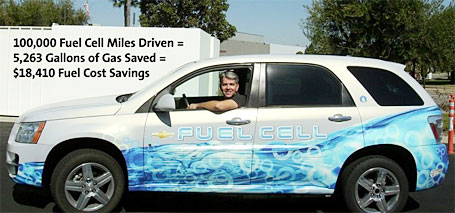
The 119 fuel cell vehicles included in General Motor’s Project Driveway cumulatively have saved over 157,894 gallons of gasoline. In fact, just one of the higher mileage Chevy Equinox SUVs saved 5,260 gallons of gas by itself.
According to GM, “A hydrogen fuel-cell-powered Chevrolet Equinox has reached 100,000 miles of real world driving. Through way renewable hydrogen, the vehicle has saved 5,260 gallons of gasoline, or $18,000 in fuel at $3.50 a gallon. The car is part of GM’s 119-vehicle Project Driveway Program, which has been running since 2007. The test fleet has accumulated nearly 3 million combined miles, accounting for 157,894 gallons of saved gasoline and $552,631 in avoided fuel cost …
“…According to Clean Energy Patent Growth Index, GM filed more fuel cell patents between 2002 and 2012 than any other automaker. The company is building a new Fuel Cell Development Laboratory in Pontiac, Mich. where the majority of future fuel cell development will take place.”
So, while Tesla’s CEO Elon Musk bags on hydrogen cars (and thinks battery electric vehicles are the cat’s pajamas), the evidence is in that even a small number of FCVs can displace a significant amount of hydrocarbon fuels and we can all breathe a little bit easier.
This is one of the most misleading and deceptive articles I have seen yet on hydrogen vehicles. Are we to assume that the cost of the hydrogen is essentially nothing? Are we ignoring the fact that the bulk of hydrogen production in the U.S. is from natural gas and coal?
As a member of the team which built the world’s very first hydrogen-powered automobile back in 1970 and someone who has been a strong supporter of hydrogen in the past, I am embarrassed by this shameless promotion. Care to discuss specifics, call my cell phone at 614-361-2162. I’m available.
Instead of this tell us how much distance between charges, the speed at which you can travel that distance, and maintenance needs.
I agree that the devil is in the details on this one including how the hydrogen was created. Was in created using solar + water, reformed methane, electrolysis via coal fired power plant, hydroelectric + water, etc. GM needs to realize that inquiring minds want to know.
Ok, the VUS are still rolling, but do they still roll with their original equipment? Did they have to change their fuel cell once a year?
Soon we will be driving cars with zero polution. A company named HyperSolar has a patent and are very close to being able to economically produce hdrogen anywhere there is sunlight and water. They plan to produce hydrogen at fueling stations eliminating the need for transportation. Hydrogen is abundant, it will be affordable and is the fuel of the future.
If we are having real concern about the nature, let the efforts and their resluts be a real one instead of creating false illusions.
What is the cost per mile? What would the vehicle cost if it were mass produced? What are the maintenence requirements? What is the range? What is the acceleration and top speed? Where will we get a “fill-up” and what is the overall environmental impact? etc., etc etc..